Currently reading
The Haunting of Hill House
The Mirror Empire
The Secret History of the Mongol Queens: How the Daughters of Genghis Khan Rescued His Empire (Audio)
Cast in Flame
 After two books away, it's a relief to have Kaylin back in Elantra. And yet for all that the series has returned to the physical geography of its core, it feels like the emotional geography is still off-center. Kaylin is in Elantra, but her interactions remain primarily with those who traveled to (or came from) the West March. There's very little of the Hawks here, or even of Sanabalis or Tiamaris. And while I do have a deep fondness for the Barrani children, who throw a unique wrench into the works of, well, pretty much everything, I miss having Kaylin's life grounded in the mundane.
After two books away, it's a relief to have Kaylin back in Elantra. And yet for all that the series has returned to the physical geography of its core, it feels like the emotional geography is still off-center. Kaylin is in Elantra, but her interactions remain primarily with those who traveled to (or came from) the West March. There's very little of the Hawks here, or even of Sanabalis or Tiamaris. And while I do have a deep fondness for the Barrani children, who throw a unique wrench into the works of, well, pretty much everything, I miss having Kaylin's life grounded in the mundane.For me, that was always the core of the series: a young woman who just wants to Do Her Job, but keeps getting caught up in magical happenings. But at this point her career as a Hawk is window dressing; she spends about a page patrolling the streets and several hundred pages throwing magical words around to fight world-destroying evil. Even the book's central plot point (Kaylin's search for housing), which _should_ be safely mundane, quickly turns mystical. I miss the chiaroscuro effect that came from blending the two worlds. All magic, all the time is blinding--and the more time the books spend in amorphous realms of metaphor, the less I care about the outcome of any of the battles.
Still: things do seem to be progressing. If we're spending more time enmeshed in magic, Kaylin is at least finally coming to _understand_ some of what she bears on her skin. And the ending is a pay-off moment that's been books in the making, and leaves me willing to continue on Kaylin's next adventure.
Cast in Sorrow
 I think I'm unusual in preferring this to Peril. There were times when it retread old ground, but it also had a genuine conclusion which promises to shake up the series some, which I appreciated. (Also, lots of Kaylin & Teela feels, which I will never complain about!) I still think the two should have stayed one book, though. And I will be very happy to return to Elantra next book.
I think I'm unusual in preferring this to Peril. There were times when it retread old ground, but it also had a genuine conclusion which promises to shake up the series some, which I appreciated. (Also, lots of Kaylin & Teela feels, which I will never complain about!) I still think the two should have stayed one book, though. And I will be very happy to return to Elantra next book.White Sands, Red Menace
 Goodbye, Dewey and Suze. I'll miss you! I am sad you have no further adventures to entertain me with through my commute.
Goodbye, Dewey and Suze. I'll miss you! I am sad you have no further adventures to entertain me with through my commute.I loved this just as much as the first one for its finely drawn characters and relationships. At first I was a little sad that Suze and Dewey were no longer spending all their time together, but there were still plenty of sisterly--sorry, brotherly--bonding moments, and it felt right that they were growing up into separate people, people who still loved each other but whose lives didn't revolve around each other. Dewey's mother was handled perfectly: possible for the audience to sympathize with, but still difficult for the characters (who have had to live with the consequences of her actions) to forgive.
If there was one weak note for me, I think it was Phil and his relationship with Terry. He's the only character who doesn't come across as two-dimensional, partly because he's so rarely on the page. If I hadn't read the first novel, with Terry and Phil excitedly discussing equations at the dinner table, I wouldn't understand why they were married at all. I understand that limiting the viewpoint to the two teens makes it difficult to show the interior of their parents' marriage, but I still think it's a shame that Phil and Terry's moment of rapprochement is entirely off-screen, on a private vacation. It's a complicated relationship, and I wanted to understand it better.
The Green Glass Sea
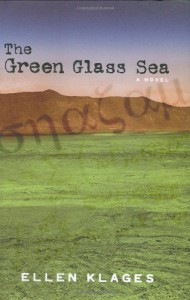 Two girls growing up at Los Alamos in the 1940s gradually build a friendship against the looming backdrop of the war effort. Middle grade is where it's at, apparently. This is a sweet story that manages to touch on a lot of serious historical issues without ever losing its core emotional thread about found family and community. There was one bit at the end where drama was built through an unbelievable bit of miscommunication that I disliked, but otherwise it was note-perfect.
Two girls growing up at Los Alamos in the 1940s gradually build a friendship against the looming backdrop of the war effort. Middle grade is where it's at, apparently. This is a sweet story that manages to touch on a lot of serious historical issues without ever losing its core emotional thread about found family and community. There was one bit at the end where drama was built through an unbelievable bit of miscommunication that I disliked, but otherwise it was note-perfect.
The Governess Affair
 Not remotely my genre, but it was the excellent combination of short, recommended by a trusted friend, and free on Amazon. Also, as it turns out, sort of adorable.
Not remotely my genre, but it was the excellent combination of short, recommended by a trusted friend, and free on Amazon. Also, as it turns out, sort of adorable.
Cast in Peril
 At this point in the series, you should know what to expect: no one answers anyone's questions, everything moves exceedingly slowly, and Kaylin saves the day with powers she barely understands. You either like it or you don't.
At this point in the series, you should know what to expect: no one answers anyone's questions, everything moves exceedingly slowly, and Kaylin saves the day with powers she barely understands. You either like it or you don't. The pacing in this one is uneven and unusually glacial even for Elantra, but that's balanced out for me by three critical soul-baring conversations (with Severn, Teela, and the Consort) where characters actually lay all their cards on the table and speak from the heart. Also, there is lots of Teela. I like Teela.
Kafka on the Shore
 If I had to choose one word to describe this book, it would be "tedious." There are interesting ideas here, but they're buried in minutia. As a novella, I might have enjoyed it; as a novel, I was mostly just glad it was over and that I wouldn't have to read any more pages about how the characters ate, dressed, or shit.
If I had to choose one word to describe this book, it would be "tedious." There are interesting ideas here, but they're buried in minutia. As a novella, I might have enjoyed it; as a novel, I was mostly just glad it was over and that I wouldn't have to read any more pages about how the characters ate, dressed, or shit.Also, I will grant that Kafka is realistic as a fifteen-year-old boy, but that doesn't change the fact that his cock is much more interesting to him than it is to me.
My version was narrated by Steven Carpenter, who does a very nice job.
Through the Woods
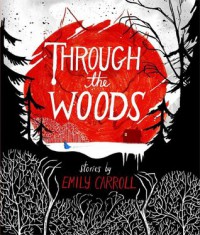 I try hard not to buy physical books, operating on a one-in, one-out policy to keep the size of my library in check. I'm not sure which book is going out to make space for this one, but I'm glad I bought it, because the ebook wouldn't be the same. This is a gorgeous piece of printing, from the embossed and textured cover to the crisp interior color.
I try hard not to buy physical books, operating on a one-in, one-out policy to keep the size of my library in check. I'm not sure which book is going out to make space for this one, but I'm glad I bought it, because the ebook wouldn't be the same. This is a gorgeous piece of printing, from the embossed and textured cover to the crisp interior color.I know Carroll through her web comics (Out of Skin is my favorite, I think), but they come out at a rate of two or three of a year, so the idea of getting five all at once was exciting. It's only four new comics, really--His Face All Red is also available as a web comic--but in a way it feels like five new ones, because the format change makes for a fundamentally different (and, I think in some ways, lesser) reading experience. I wonder how the other four would have read if they'd been published as web comics instead of in book form; one of Carroll's strengths is making use of scrolling and enormous pages that have to be navigated back and forth, up and down, to disorient the reader and draw them deeper into the horror.
That's not to say they're not strong as print comics, too. My favorite in the collection is "A Lady's Hands Are Cold," which makes gorgeous use of color. It's an old story, but it feels fresh here. "Our Neighbor's House" effectively builds its horror toward one of Carroll's trademark inconclusive endings that manages to be all the more ominous for its lack of clear answers, while "My Friend Janna" leaves open the question of where, exactly, our sympathies should lie. In some ways I found "The Nesting Place" the weakest of the set, because it has by far the most traditional narrative, but it's balanced by some of the loveliest art, especially the protagonist's subtly captured expressions.
All of the stories deserve rereading . . . but maybe not as bedtime reading, next time.
Heir Apparent
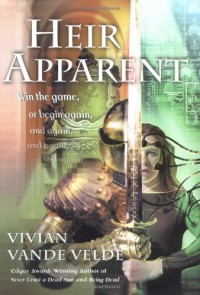 This book is an excellent example of how much the YA genre has shifted over the past decade. I read a fair amount of current YA, and while I'm technically old for it, I'm clearly not that far out of the marketing department's sights. Publishers Weekly informs me that today's YA is generally aimed at the sixteen to twenty-five set.
This book is an excellent example of how much the YA genre has shifted over the past decade. I read a fair amount of current YA, and while I'm technically old for it, I'm clearly not that far out of the marketing department's sights. Publishers Weekly informs me that today's YA is generally aimed at the sixteen to twenty-five set.But Heir Apparent was published in 2002, when YA was still aimed firmly at young adults--that is, at kids who hadn't yet left home. Even if I'd found in 2002, when I was still a teenager albeit one a couple years into her college career, I'm pretty sure I would have found it painfully young. The protagonist is fifteen, but if anything I'd say this book is targeted at twelve- or thirteen-year-olds, following the classic "make the protagonist older than the audience" formula of middle-grade fiction.
I will say this for Giannine: unlike the protagonists of many of today's YA novels, she's convincingly teenaged. Unfortunately, at this point I'm far enough removed from teenagerhood that this only makes me sigh and grit my teeth. And yet I kept reading, because the game Giannine plays was genuinely compelling to me. I'm fascinated by game design, and I thought Velde's description of Heir Apparent the game managed to walk the line of telling a compelling story that still seemed believably programmable as a computer game. I was glad we got to see so many forks and wish I could explore others.
Sadly, that plot kept getting interrupted by the frame plot, which mostly just annoyed the hell out of me. It made the unfortunately frequent error of raising the states too high, by which I mean I knew the author was never going to make good on the threat so it provided none of the tension it should have. Specifically, the frame story has Giannine trapped within her game by a terrorist attack that fried the computer, preventing her from being disconnected safely by third parties; if she doesn't win, she'll die. But this is a first-person novel aimed at middle school students. I had exactly zero fear that the protagonist would actually die, and I'm pretty sure I would have felt the same if I'd read it when I was twelve. It doesn't take that much genre savvy to work it out.
It's unfortunate, because I can think of so many better frame stories. Giannine has parent issues out the wazoo; maybe one of her parents could have been an excellent gamer whose reputation she was trying to live up to, or maybe there could have been a cash prize for the game that would have given her the money she needed to finally initiate a visit to one of her parents on her own terms. In either case, there would still have been an external motivation for Giannine to win . . . but there also would have been real tension about whether Giannine would succeed in gaining parental approval/time, or whether she would need to learn how to do without.
And then there's the broader frame story, which is painfully unsubtle. "This book is dedicated with affection for, but no patience with, those who would protect our children through humorless moralizing and paranoia about fantasy," says the dedication, and of course, in the story, it's anti-fantasy protestors who put Giannine's life at risk by damaging the game terminal she's playing on. Of course it is. I honestly find myself wondering if the author realized that her adventure novel made playing fantasy games sound dangerous and swapped ecoterrorists for save-our-children-terrorists at the last second just to make sure the moral aligned with her own beliefs. Minus one star for blunt-force moralizing, and we get a solid two stars. Recommended only for the pre-high school set.
Broken Homes
 The pacing of this is deceptively slow; I think I need to reread it to grasp how all the moving parts fit together. But mostly I am left with an overwhelming sense of, "Oh, Peter." And Lesley. And Nightingale. They all need hugs.
The pacing of this is deceptively slow; I think I need to reread it to grasp how all the moving parts fit together. But mostly I am left with an overwhelming sense of, "Oh, Peter." And Lesley. And Nightingale. They all need hugs.
Servant of the Underworld
 Two stars for the worldbuilding, which kept me reading despite feelings for the main character that wavered between apathy and antipathy. de Bodard's descriptions of the social and political arrangements of the Aztec Empire are really interesting. I wish the magic had been equally interesting, but alas it seems rather D&Dish, all shields and mage sight and magic bolts (albeit fueled by blood). I would have preferred something more numinous.
Two stars for the worldbuilding, which kept me reading despite feelings for the main character that wavered between apathy and antipathy. de Bodard's descriptions of the social and political arrangements of the Aztec Empire are really interesting. I wish the magic had been equally interesting, but alas it seems rather D&Dish, all shields and mage sight and magic bolts (albeit fueled by blood). I would have preferred something more numinous.Part of my frustration was that I went into this expecting a mystery novel, and it really, really isn't; it's epic fantasy, with the mystery just another McGuffin. The fun of a mystery novel, to me, is the feeling that if I were just a little brighter and more focused I could piece together the clues myself, the sense that I'm solving the crime alongside the detective. But that requires the narrative actually give me clues, and de Bodard isn't interested in that. As an example, there's a scene where the protagonist examines the remains of the deceased, including the knife sheath she left behind. He then later has the realization that the fact that the sheath was designed to be worn on the ankle, rather than on the belt, is an important clue and immediately explains why it's important . . . which is the first we, the reader, realize it's an ankle sheath, because previously it's just described as "an ornate sheath." The protagonists also had a lot of "ah ha!" moments based on his understanding of how magic worked, which I had to take on faith, because the magic system was never otherwise explained.
I will not be reading the sequels.
Whispers Under Ground
 I like this better than either of the previous books; the voice is just as strong, but Aaronovitch finally seems to be coming into his own as far as plotting is concerned. I'm also gradually growing more connected to the secondary characters, who are lightly sketched but in a way that accretes as the series continues.
I like this better than either of the previous books; the voice is just as strong, but Aaronovitch finally seems to be coming into his own as far as plotting is concerned. I'm also gradually growing more connected to the secondary characters, who are lightly sketched but in a way that accretes as the series continues.I do want to file a "WTF?" about the back cover copy. According to mine, "At least he won't be alone. No, the FBI has sent over a crack agent to help. She's young, ambitious, beautiful . . . and a born-again Christian apt to view any magic as the work of the devil. Oh yeah--that's going to go well." This 1) is a baffling description of Reynolds, who is described as none of these things in text and seems to have no more difficulty with magic than anyone else (in fact, she takes it more calmly than many) and 2) seems like it's an attempt to imply there will be some sort of romantic tension between Peter and Reynolds, when there's nothing of the sort--in fact, given Peter's general propensity to hit on anything in a skirt, it's a little remarkable just how non-existent their chemistry is. Possibly of note, her description in-text is "thin and white," which may be the blurb writer's idea of beauty but has been pretty clearly established in the series as far from Peter's ideal. I have seen some bad blurbs in my time, but this is the worst in a while.
Guardian of the Dead
 Another earnest novel, but with enough plot (and thoughtful characterization) to balance out its more lecturey moments. The writing occasionally rose above serviceable to reach something numinous, particularly in the descriptions of how the world looked to those who could see myth overlaid on reality. I appreciated its rejection of genre conventions, from Ellie and Iris's rivalry-quickly-turned-friendship to the lack of love triangle to the messy ending, which allows for hope without tying everything up in a neat and tidy bow. I did think the curse was gilding the lily; there were enough issues between Our Wacky Couple, given their mutual lack of self-esteem and on-page history of violence and violations of trust, that additional externally generated barriers seemed a distraction. But it's not like it plays a big role in the plot. I wonder if it was more important in an earlier draft.
Another earnest novel, but with enough plot (and thoughtful characterization) to balance out its more lecturey moments. The writing occasionally rose above serviceable to reach something numinous, particularly in the descriptions of how the world looked to those who could see myth overlaid on reality. I appreciated its rejection of genre conventions, from Ellie and Iris's rivalry-quickly-turned-friendship to the lack of love triangle to the messy ending, which allows for hope without tying everything up in a neat and tidy bow. I did think the curse was gilding the lily; there were enough issues between Our Wacky Couple, given their mutual lack of self-esteem and on-page history of violence and violations of trust, that additional externally generated barriers seemed a distraction. But it's not like it plays a big role in the plot. I wonder if it was more important in an earlier draft.
When Someone Dies: The Practical Guide to the Logistics of Death
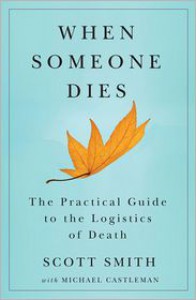 If you are looking for sensitive guidance on the grieving process, this is not the right book for you. If you want blunt advice on what to do with the body of the decedent and how to close out his or her financial interests, on the other hand, this is an excellent place to start. Four stars instead of five because its brevity means it focuses on common scenarios and the only real advice it has for the complex situation I'm dealing with is "consult a lawyer." But no book can be all things to all people.
If you are looking for sensitive guidance on the grieving process, this is not the right book for you. If you want blunt advice on what to do with the body of the decedent and how to close out his or her financial interests, on the other hand, this is an excellent place to start. Four stars instead of five because its brevity means it focuses on common scenarios and the only real advice it has for the complex situation I'm dealing with is "consult a lawyer." But no book can be all things to all people.If you're reading this review and thinking, "That sounds like a useful book some day, but I don't need it now," it is probably an excellent time for you to read this book. Someone close to you will, eventually, die. Wouldn't you rather be prepared than trying to learn things at the same time you're processing your grief?
The last chapter also provides an overview on how to structure your affairs to make life easier for your executors and beneficiaries and save them from whatever headache has driven you to read this book.
Enchantress from the Stars
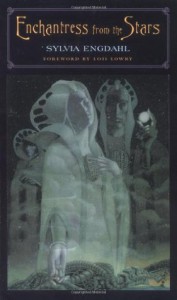 I think had I encountered this book for the first time at age 12 I would have adored it. As-is, it's sweet and touching (and the unusual structure is pulled off amazingly well), but it doesn't really have the depth to capture my adult heart. Solutions come too easily; people behave, always, as predicted. There are also some very dated aspects that make it obvious the book was written in the 70s. (Engdahl was clearly heavily influenced by the John Campbell era of science fiction, for example; psionics are the ultimate sign of an advanced civilization.)
I think had I encountered this book for the first time at age 12 I would have adored it. As-is, it's sweet and touching (and the unusual structure is pulled off amazingly well), but it doesn't really have the depth to capture my adult heart. Solutions come too easily; people behave, always, as predicted. There are also some very dated aspects that make it obvious the book was written in the 70s. (Engdahl was clearly heavily influenced by the John Campbell era of science fiction, for example; psionics are the ultimate sign of an advanced civilization.)The relationship dynamics intrigue and puzzle me. I am not quite sure what we're supposed to make of Elana's continued assurance throughout her romance with Georyn that of course she'll marry Evrek, even as she and he barely interact and seem to have no chemistry at all. Is the idea that an advance civilization is also beyond such primitive notions of marriage for love? I wish the Elana/Evrek dynamic had been explored more, since it had the potential to be one of the most interesting in the book. That may, ultimately, be what drives me to pick up the sequel.
Bimbos of the Death Sun
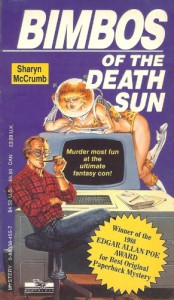 Ridiculously fluffy and exactly what my brain needed. I thought the mystery was a little lacking, but the satire of con culture more than made up for that.
Ridiculously fluffy and exactly what my brain needed. I thought the mystery was a little lacking, but the satire of con culture more than made up for that.






